新版八年级英语上册if引导的条件状语从句
- 格式:pptx
- 大小:95.36 KB
- 文档页数:5
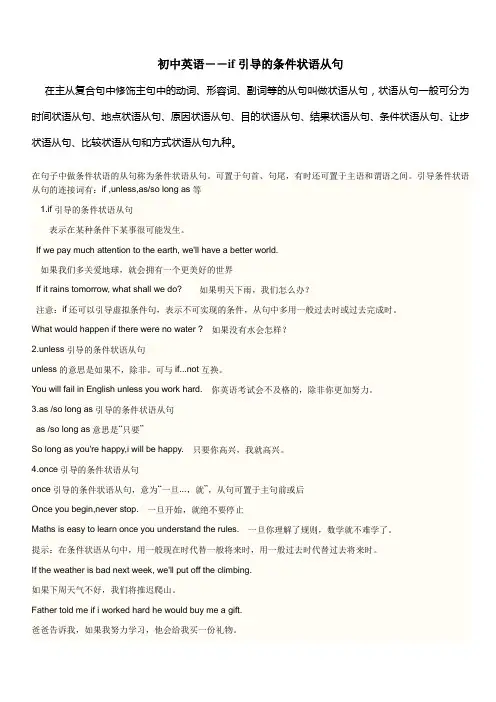
初中英语――if引导的条件状语从句在主从复合句中修饰主句中的动词、形容词、副词等的从句叫做状语从句,状语从句一般可分为时间状语从句、地点状语从句、原因状语从句、目的状语从句、结果状语从句、条件状语从句、让步状语从句、比较状语从句和方式状语从句九种。
在句子中做条件状语的从句称为条件状语从句。
可置于句首、句尾,有时还可置于主语和谓语之间。
引导条件状语从句的连接词有:if ,unless,as/so long as等1.if引导的条件状语从句表示在某种条件下某事很可能发生。
If we pay much attention to the earth, we'll have a better world.如果我们多关爱地球,就会拥有一个更美好的世界If it rains tomorrow, what shall we do? 如果明天下雨,我们怎么办?注意:if还可以引导虚拟条件句,表示不可实现的条件,从句中多用一般过去时或过去完成时。
What would happen if there were no water ? 如果没有水会怎样?2.unless引导的条件状语从句unless的意思是如果不,除非。
可与if...not互换。
You will fail in English unless you work hard. 你英语考试会不及格的,除非你更加努力。
3.as /so long as引导的条件状语从句as /so long as意思是“只要”So long as you're happy,i will be happy. 只要你高兴,我就高兴。
4.once引导的条件状语从句once引导的条件状语从句,意为“一旦...,就”,从句可置于主句前或后Once you begin,never stop. 一旦开始,就绝不要停止Maths is easy to learn once you understand the rules. 一旦你理解了规则,数学就不难学了。
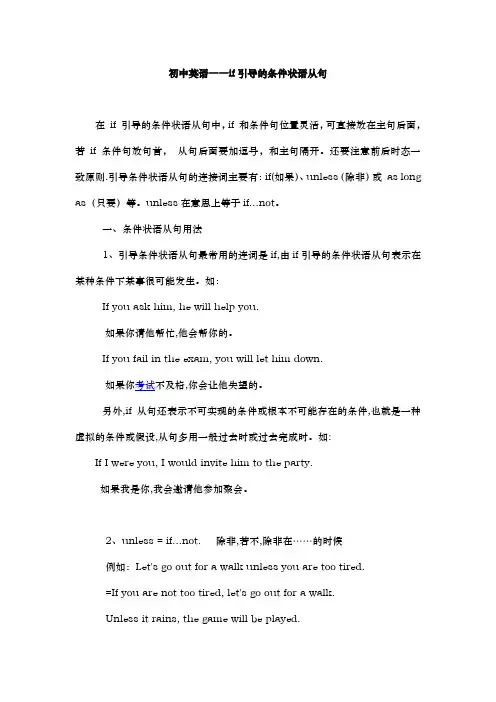
初中英语――if引导的条件状语从句在if 引导的条件状语从句中,if 和条件句位置灵活,可直接放在主句后面,若if 条件句放句首,从句后面要加逗号,和主句隔开。
还要注意前后时态一致原则.引导条件状语从句的连接词主要有:if(如果)、unless(除非)或as long as(只要)等。
unless在意思上等于if...not。
一、条件状语从句用法1、引导条件状语从句最常用的连词是if,由if引导的条件状语从句表示在某种条件下某事很可能发生。
如:If you ask him, he will help you.如果你请他帮忙,他会帮你的。
If you fail in the exam, you will let him down.如果你考试不及格,你会让他失望的。
另外,if从句还表示不可实现的条件或根本不可能存在的条件,也就是一种虚拟的条件或假设,从句多用一般过去时或过去完成时。
如:If I were you, I would invite him to the party.如果我是你,我会邀请他参加聚会。
2、unless = if...not. 除非,若不,除非在……的时候例如:Let's go out for a walk unless you are too tired.=If you are not too tired, let's go out for a walk.Unless it rains, the game will be played.除非下雨,比赛将照常进行。
二、时态问题在条件状语从句中,要注意“主将从现”的规定,即主句用一般将来时,从句用一般现在时表示将来时。
例句:I will e to see you if I have time.我有时间,我就来看你。
三如果if 条件句谈论的是重复发生和预示要发生的情景和事件,则主从句大多用一般现在时态。
如:If bears are in danger ,they attack people.误区提醒if 既可以引导条件状语从句,表示“如果”,也可以引导宾语从句,表达“是否”。
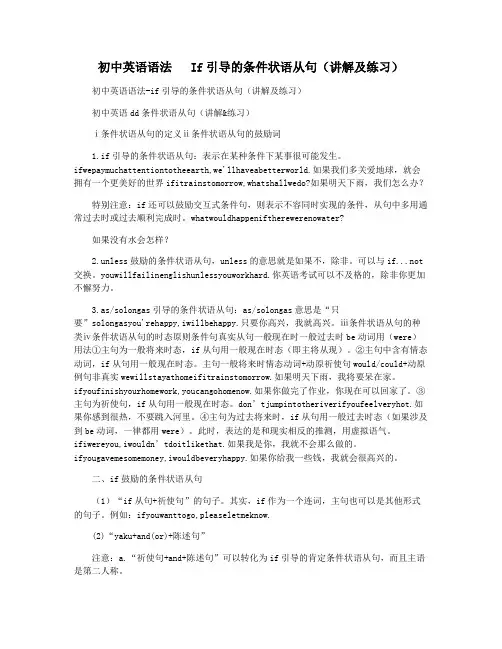
初中英语语法 If引导的条件状语从句(讲解及练习)初中英语语法-if引导的条件状语从句(讲解及练习)初中英语dd条件状语从句(讲解&练习)ⅰ条件状语从句的定义ⅱ条件状语从句的鼓励词1.if引导的条件状语从句:表示在某种条件下某事很可能发生。
ifwepaymuchattentiontotheearth,we'llhaveabetterworld.如果我们多关爱地球,就会拥有一个更美好的世界ifitrainstomorrow,whatshallwedo?如果明天下雨,我们怎么办?特别注意:if还可以鼓励交互式条件句,则表示不容同时实现的条件,从句中多用通常过去时或过去顺利完成时。
whatwouldhappeniftherewerenowater?如果没有水会怎样?2.unless鼓励的条件状语从句,unless的意思就是如果不,除非。
可以与if...not 交换。
youwillfailinenglishunlessyouworkhard.你英语考试可以不及格的,除非你更加不懈努力。
3.as/solongas引导的条件状语从句:as/solongas意思是“只要”solongasyou'rehappy,iwillbehappy.只要你高兴,我就高兴。
ⅲ条件状语从句的种类ⅳ条件状语从句的时态原则条件句真实从句一般现在时一般过去时be动词用(were)用法①主句为一般将来时态,if从句用一般现在时态(即主将从现)。
②主句中含有情态动词,if从句用一般现在时态。
主句一般将来时情态动词+动原祈使句would/could+动原例句非真实wewillstayathomeifitrainstomorrow.如果明天下雨,我将要呆在家。
ifyoufinishyourhomework,youcangohomenow.如果你做完了作业,你现在可以回家了。
③主句为祈使句,if从句用一般现在时态。
don’tjumpintotheriverifyoufeelveryhot.如果你感到很热,不要跳入河里。
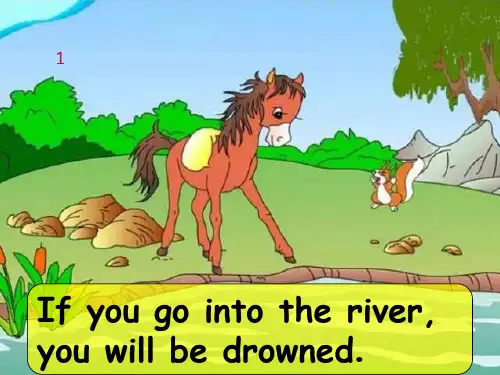

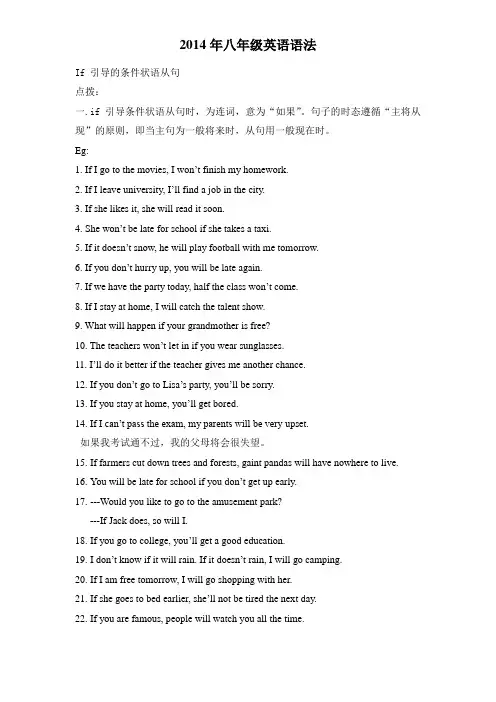
If 引导的条件状语从句点拨:一.if 引导条件状语从句时,为连词,意为“如果”。
句子的时态遵循“主将从现”的原则,即当主句为一般将来时,从句用一般现在时。
Eg:1. If I go to the movies, I won’t finish my homework.2. If I leave university, I’ll find a job in the city.3. If she likes it, she will read it soon.4. She won’t be late for school if she takes a taxi.5. If it doesn’t snow, he will play football with me tomorrow.6. If you don’t hurry up, you will be late again.7. If we have the party today, half the class won’t come.8. If I stay at home, I will catch the talent show.9. What will happen if your grandmother is free?10. The teachers won’t let in if you wear sunglasses.11. I’ll do it better if the teacher gives me another chance.12. If you don’t go to Lisa’s party, you’ll be sorry.13. If you stay at home, you’ll get bored.14. If I can’t pass the exam, my parents will be very upset.如果我考试通不过,我的父母将会很失望。

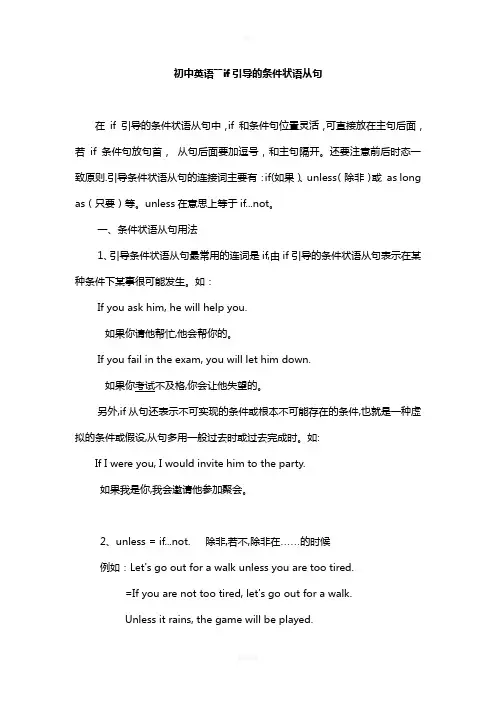
初中英语――if引导的条件状语从句在if 引导的条件状语从句中,if 和条件句位置灵活,可直接放在主句后面,若if 条件句放句首,从句后面要加逗号,和主句隔开。
还要注意前后时态一致原则.引导条件状语从句的连接词主要有:if(如果)、unless(除非)或as long as(只要)等。
unless在意思上等于if...not。
一、条件状语从句用法1、引导条件状语从句最常用的连词是if,由if引导的条件状语从句表示在某种条件下某事很可能发生。
如:If you ask him, he will help you.如果你请他帮忙,他会帮你的。
If you fail in the exam, you will let him down.如果你考试不及格,你会让他失望的。
另外,if从句还表示不可实现的条件或根本不可能存在的条件,也就是一种虚拟的条件或假设,从句多用一般过去时或过去完成时。
如:If I were you, I would invite him to the party.如果我是你,我会邀请他参加聚会。
2、unless = if...not. 除非,若不,除非在……的时候例如:Let's go out for a walk unless you are too tired.=If you are not too tired, let's go out for a walk.Unless it rains, the game will be played.除非下雨,比赛将照常进行。
二、时态问题在条件状语从句中,要注意“主将从现”的规定,即主句用一般将来时,从句用一般现在时表示将来时。
例句:I will come to see you if I have time.我有时间,我就来看你。
三如果if 条件句谈论的是重复发生和预示要发生的情景和事件,则主从句大多用一般现在时态。
如:If bears are in danger ,they attack people.误区提醒if 既可以引导条件状语从句,表示“如果”,也可以引导宾语从句,表达“是否”。

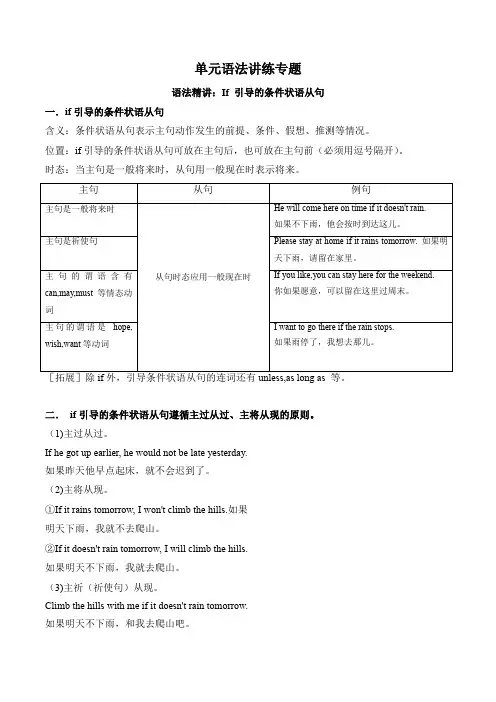
单元语法讲练专题语法精讲:If 引导的条件状语从句一.if引导的条件状语从句含义:条件状语从句表示主句动作发生的前提、条件、假想、推测等情况。
位置:if引导的条件状语从句可放在主句后,也可放在主句前(必须用逗号隔开)。
时态:当主句是一般将来时,从句用一般现在时表示将来。
主句从句例句主句是一般将来时从句时态应用一般现在时He will come here on time if it doesn't rain.如果不下雨,他会按时到达这儿。
主句是祈使句Please stay at home if it rains tomorrow. 如果明天下雨,请留在家里。
主句的谓语含有can,may,must等情态动词If you like,you can stay here for the weekend.你如果愿意,可以留在这里过周末。
主句的谓语是hope, wish,want等动词I want to go there if the rain stops.如果雨停了,我想去那儿。
二.if引导的条件状语从句遵循主过从过、主将从现的原则。
(1)主过从过。
If he got up earlier, he would not be late yesterday.如果昨天他早点起床,就不会迟到了。
(2)主将从现。
①If it rains tomorrow, I won't climb the hills.如果明天下雨,我就不去爬山。
②If it doesn't rain tomorrow, I will climb the hills.如果明天不下雨,我就去爬山。
(3)主祈(祈使句)从现。
Climb the hills with me if it doesn't rain tomorrow.如果明天不下雨,和我去爬山吧。
(4)主情(情态动词)从现。
If it doesn't rain tomorrow, I might climb the hills.如果明天不下雨,我可能会去爬山。
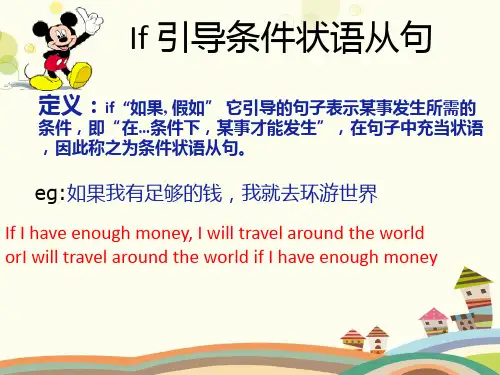
第10讲if 引导条件状语从句1、知晓条件状语从句结构及用法。
2、熟练掌握if引导状语从句的同义转换。
【拓展】if /when 引导状语从句和宾语从句这两种从句。
从句的时态的确定。
A.If B.And C.Be D.Or【答案】A【详解】句意:如果你不快点,你将错过公共汽车。
考查连词辨析。
if如果;and和;be是;or否则。
“you don’t hurry up”是错过公共汽车的条件,用if引导条件状语从句。
故选A。
考点2:if引导条件状语从句时态的确定1.—Would you like to go fishing with me this Sunday?—If it ________, I will go.A.doesn’t rain B.rains C.won’t rain D.didn’t rain【答案】A【详解】句意:——这个星期天你愿意和我一起去钓鱼吗?——如果不下雨,我就去。
考查时态。
if引导的条件状语从句,从句中用一般将来时,主句中用一般现在时,根据“If it..., I will go.”可知,此处表达“不下雨”。
故选A。
2.—What are you going to do this weekend?—We’ll go to have a picnic if it ________.A.rains B.is raining C.doesn’t rain D.won’t rain【答案】C【详解】句意:——这个周末你打算做什么?——如果不下雨,我们将去野餐。
考查条件状语从句。
rains第三人称单数形式;is raining现在进行时;doesn’t rain不下雨,一般现在时态;won’t rain一般将来时。
if引导的条件状语从句,主句一般将来时态,从句一般现在时态。
选项B、D不正确。
根据“We’ll go to have a picnic”可知,从句应该是“如果不下雨”,用否定形式doesn’t rain。
初中英语――if引导的条件状语从句在if 引导的条件状语从句中,if 和条件句位置灵活,可直接放在主句后面,若if 条件句放句首,从句后面要加逗号,和主句隔开。
还要注意前后时态一致原则.引导条件状语从句的连接词主要有:if(如果)、unless(除非)或as long as (只要)等。
unless在意思上等于if...not。
一、条件状语从句用法1、引导条件状语从句最常用的连词是if,由if引导的条件状语从句表示在某种条件下某事很可能发生。
如:If you ask him, he will help you.如果你请他帮忙,他会帮你的。
If you fail in the exam, you will let him down.如果你考试不及格,你会让他失望的。
另外,if从句还表示不可实现的条件或根本不可能存在的条件,也就是一种虚拟的条件或假设,从句多用一般过去时或过去完成时。
如:If I were you, I would invite him to the party.如果我是你,我会邀请他参加聚会。
2、unless = if...not.除非,若不,除非在……的时候例如:Let's go out for a walk unless you are too tired.=If you are not too tired, let's go out for a walk.Unless it rains, the game will be played.除非下雨,比赛将照常进行。
二、时态问题在条件状语从句中,要注意“主将从现”的规定,即主句用一般将来时,从句用一般现在时表示将来时。
例句:I will come to see you if I have time.我有时间,我就来看你。
三如果if 条件句谈论的是重复发生和预示要发生的情景和事件,则主从句大多用一般现在时态。
如:If bears are in danger ,they attack people.误区提醒if 既可以引导条件状语从句,表示“如果”,也可以引导宾语从句,表达“是否”。
初中英语――if引导的条件状语从句在if 引导的条件状语从句中,if 和条件句位置灵活,可直接放在主句后面,若if 条件句放句首,从句后面要加逗号,和主句隔开。
还要注意前后时态一致原则.引导条件状语从句的连接词主要有:if(如果)、unless(除非)或as long as (只要)等。
unless在意思上等于if...not。
一、条件状语从句用法1、引导条件状语从句最常用的连词是if,由if引导的条件状语从句表示在某种条件下某事很可能发生。
如:If you ask him, he will help you.如果你请他帮忙,他会帮你的。
If you fail in the exam, you will let him down.如果你考试不及格,你会让他失望的。
另外,if从句还表示不可实现的条件或根本不可能存在的条件,也就是一种虚拟的条件或假设,从句多用一般过去时或过去完成时。
如:If I were you, I would invite him to the party.如果我是你,我会邀请他参加聚会。
2、unless = if...not.除非,若不,除非在……的时候例如:Let's go out for a walk unless you are too tired.=If you are not too tired, let's go out for a walk.Unless it rains, the game will be played.除非下雨,比赛将照常进行。
二、时态问题在条件状语从句中,要注意“主将从现”的规定,即主句用一般将来时,从句用一般现在时表示将来时。
例句:I will come to see you if I have time.我有时间,我就来看你。
三如果if 条件句谈论的是重复发生和预示要发生的情景和事件,则主从句大多用一般现在时态。
如:If bears are in danger ,they attack people.误区提醒if 既可以引导条件状语从句,表示“如果”,也可以引导宾语从句,表达“是否”。